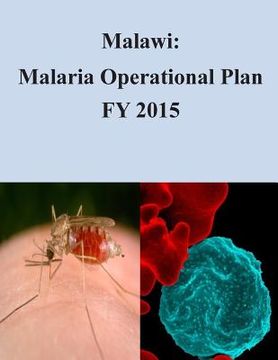Reseña del libro "Malawi: Malaria Operational Plan FY 2015 (en Inglés)"
Malaria prevention and control are major foreign assistance objectives of the U.S. Government (USG). In May 2009, President Barack Obama announced the Global Health Initiative (GHI), a six-year, comprehensive effort to reduce the burden of disease and promote healthy communities and families around the world, with a focus on women and girls. The President's Malaria Initiative (PMI) is a core component of the GHI, along with HIV/AIDS and tuberculosis. PMI was launched in June 2005 as a five-year, $1.2 billion initiative to rapidly scale up malaria prevention and treatment interventions and reduce malaria-related mortality by 50% in 15 high-burden countries in sub-Saharan Africa. With passage of the 2008 Lantos-Hyde Act, funding for PMI has now been extended and, as part of the GHI, the goal of PMI has been adjusted to reduce malaria-related mortality by 70% in the original 15 countries by the end of 2015. This will be achieved by continuing to scale up coverage of the most vulnerable groups - children under five years of age and pregnant women - with proven preventive and therapeutic interventions, including artemisinin-based combination therapies (ACTs), insecticide-treated nets (ITNs), intermittent preventive treatment of pregnant women (IPTp), and indoor residual spraying (IRS).Malawi became a PMI focus country in 2006. It was one of eight countries selected in FY 2011 as a "GHI Plus" country, and receives additional technical and management assistance to rapidly implement GHI's approach. The Ministry of Health's (MoH) National Malaria Control Program (NMCP), with support from PMI and other partners, has been able to scale up the distribution of ACTs, IPTp using sulfadoxine-pyrimethamine (SP), and ITNs, despite a weak health infrastructure. The 2012 Malaria Indicator Survey (MIS) found that 54% of pregnant women reported taking two or more doses of SP for IPTp, which is higher than in many African countries. Additionally, household ITN ownership has increased from 38% in 2006 (Multiple Indicator Cluster Survey, MICS) to 55% in 2012. Similarly, children under five and pregnant women who reported sleeping under an ITN the night prior increased from 25% and 8% in 2006, respectively, to 56% and 51% in 2012.The 2010 and 2012 MIS also documented a reduction in parasitemia among children under five from 43% to 28%; however, little or no improvement was noted for most of the other key indicators of progress (ITN ownership, ITN use, and antimalarial treatment) and IPTp uptake decreased from 60% in 2010 to 54% in 2012. As the 2012 MIS was completed prior to the 2012 ITN mass distribution campaign, 2012 MIS indicators for ITN ownership and use do not reflect the outcome of this campaign.Despite the advances made since the initiation of PMI in Malawi, the MoH estimates that malaria still accounts for over a third of all outpatient visits; more than 4 million suspected cases were reported in 2012 (MoH, 2012). Malaria also is the number one cause of hospital admissions among children under five, being responsible for about 40% of all hospitalizations in this age group (MOH, 2009). Approximately 98% of malaria cases are due to Plasmodium falciparum.Other than PMI, the majority of the funding for malaria activities in Malawi comes from the Global Fund to Fight AIDS, Tuberculosis, and Malaria (Global Fund) and donor and government funds pooled through the health sector-wide approach (SWAp). The existing Global Fund grants focus on commodity procurement and distribution, including ITNs for routine and mass distribution and rapid diagnostic tests (RDTs) and ACTs for case management at the facility level; pooled donor and government funds contribute to the remaining malaria control activities.

